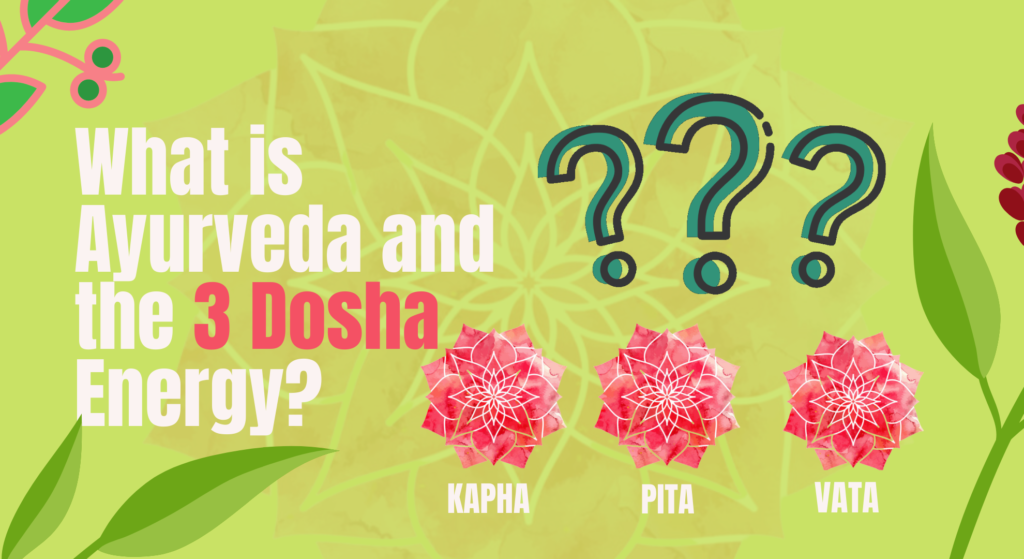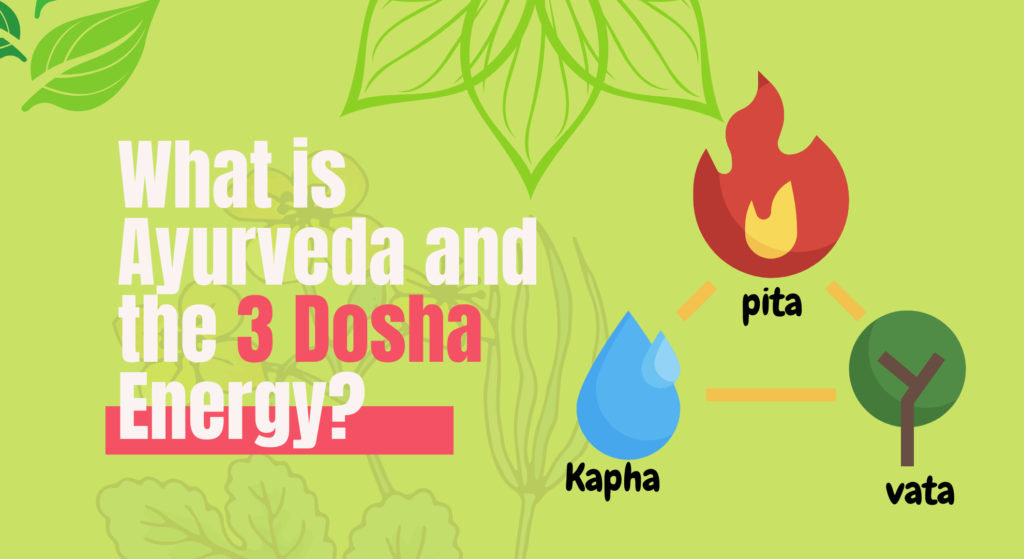Introduction
Ayurveda is an ancient Indian system of medicine that dates back 5,000 years and can be found in many practices worldwide today. Ayurveda teaches that there are three different energy types within each individual known as doshas: Vata (air), Pitta (fire), and Kapha (water).
Each dosha energy type is associated with a certain element of nature, such as wind , water; therefore, having a balanced amount of each dosha provides us with optimal health since there are no “good” or “bad” Vedic astrology signs – only different combinations of which make up who we are. Based on the idea that health and well-being are determined by the balance between three forces known as doshas (Vata, Pitta, Kapha), Ayurvedic practitioners use a combination of diet and lifestyle changes to restore balance within the body. This can help prevent illness or reduce symptoms in those who are already unwell.
The concept behind Ayurveda isn’t just theoretical; it has real-world consequences for your life today: whether you’re eating right, making sure you get enough sleep—or even choosing what kind of shoes to wear.
Vata’s personality
Vata is known as the ‘wind’ type of person.
You’re a Vata. Vatas are known as the ‘wind’ type of person. They are adaptable and versatile, and they enjoy change. You should be proud of this.
Vatas have lively minds, and they love to talk a lot. They are also very spontaneous.
In essence, they are adaptable and versatile, and they enjoy change.
They can be flexible when it comes to new situations or ideas. Vatas enjoy learning new things and are generally good at most things they do.
Vata people can be very busy but can walk away from an activity if they feel like doing something other than doing it.
They are great at coming up with ideas and solving problems, but they can get distracted by too many conversations or tasks at once. Vata’s are very creative and have a lot of energy, which makes them great at multitasking.
They enjoy being in the spotlight and the center of attention, but sometimes their ideas turn out differently than planned because they rush through things without thinking about what could go wrong or how other people will react.
They are also very spontaneous and enjoy traveling and trying new things.
They’re always up for a new adventure, which is why Vata love to travel—but don’t like planning.
They embrace the journey as it unfolds without having to plan every little detail out beforehand.
They need help focusing on the details, and sticking to their routines is hard.
They are more interested in the big picture than they are in the small things, which means that they can be very good at taking action but could be better at following through on those actions.
This can make Vata types overwhelmed by how many tasks they need to do, so these individuals need to remember that even if they don’t have time or energy to finish everything today, it doesn’t mean that those things won’t get done tomorrow.

Vata’s skin appearance
Vata skin is quite different from pitta and Kapha skin.
Vata’s skin is usually thin and dry, more likely to have poor elasticity and tends to bruise easily because it lacks moisture and fat stores.
It’s also more likely to wrinkle and bruising than other skin types. These characteristics result from a Vata constitution in the body’s nervous system.
Wrinkles are common at a young age.
Vata skin has a higher loss of collagen than other types, and it’s common for people with Vata complexion to have fine lines at a young age.
You can help maintaining and hydrating prevent wrinkles in your early 20s by keeping your skin hydrated and using anti-aging products.
The combination of dryness and thinness can cause the outer layer of your skin to become brittle and cracked, making it easy to tear or break.
As a vata, your skin is more delicate and prone to damage than other skin types. As a result, you must take extra precautions when doing rigorous physical activity, such as exercising or playing sports.
You must use cushioning under the areas where the most pressure will be placed on your body during these activities.
Cold weather will cause Vata skin to lose moisture more quickly than warm weather.
Vata skin is more prone to drying and wrinkling than other types. Vata people are also more likely to bruise, which can be caused by exposure to cold weather or physical exertion (like working out).
Vata’s skin is irregular, so it may appear stretched or sagging in some places. This can make Vata people look more tired than they are.
Maintain a healthy Vata balance.
Massage your body and head regularly.
Avoid fasting or going on an empty stomach for an extended period.
Take steam baths regularly.
Use gentle purification methods such as Basti or Vamana.
Dress warmly and in layers.
Kapha personality
Kapha is among the three doshas or body types in Ayurveda.
Kapha personalities are gentle, compassionate, and grounded.
You are rooted in the present moment and focused on what’s happening around you.
You experience life as it unfolds without expecting anything in particular to happen.
You enjoy being in the moment because it allows you to appreciate all life offers at any given time.
You are a dreamer.
You see the world differently and have big dreams that make people around you wonder how you do it. You may not be afraid to dream big, but you also dare to make those dreams come true.
You are a visionary. Your ideas are unique and outside the box, but they can also be implemented in the real world!
You are calm.
When it comes to stress and agitation, you’re the Zen master of your group. You can remain calm and composed even when faced with difficult situations.
Too much of anything can become toxic for your health, so don’t be afraid to show some emotion once in a while.
You are a slow-paced person who does not like to be rushed. You don’t like being stressed out or busy all the time. You want to take your time and enjoy the small things in life.
You are steady, even-tempered, and consistent.
You are not easily distracted by the things that are going on around you. You also have a calm demeanor, which makes you a good listener. Your moods don’t change often; if they do change, it’s usually for the better.
You value simplicity and minimalism because you prefer things that don’t require a lot of upkeep. You’re likely attracted to simple, minimalist designs and natural materials like wood and stone.
You also tend to appreciate clean lines and simple shapes—and if you do love a good design flourish, it will be balanced by something else in your decor that brings a bit of earthy grounding energy into the space.
You feel more deeply than others.
The world is more colorful for you. You feel things deeply, and your sensitivity can be both a blessing and a curse.
You are more intuitive than most people, but you also have a strong sense of empathy, making it hard for you to detach yourself from others’ problems and difficulties.
Your feelings need to be expressed before they can be released.
Kapha people are known to be calm, relaxed, and even-tempered. They tend to have slower metabolisms than other doshas, making them less likely to overeat.
Kapha skin appearance
Kapha skin is generally heavy and tends to have more subcutaneous fat.
Kapha is a type of human that has thin tissue and excess oil in its skin. Kapha may be prone to eczema, allergies (particularly food allergies), and acne, usually due to the main cause of hormonal imbalance it may also be caused by diet or stress.
The skin can be easily damaged by sun exposure or smoking.
Dryness is uncommon for this constitution type because kaphas are naturally oily through their sebaceous glands.
As a result, Kapha’s skin often appears thick and dull.
This is because your skin loves to hold on to moisture and can get quite oily. Kapha skin appearance is oily and can have large pores. This skin type is prone to acne breakouts due to excess wind (Vata) or excessive sun exposure.
Kapha people have an oily nose and a tendency to develop acne when they are young due to hormonal changes during puberty.
Keep a balance of Kapha.
Experiment with eliminating salt from your diet. Instead, incorporate pungent spices such as pepper, mustard seeds, ginger, cloves, and cayenne pepper into your diet.
Not only will these spices stimulate and balance Kapha, but they will also improve the functioning of your digestive system.

Pitta personality
They are very intelligent and can handle many tasks at once.
The Pitta personality can think outside the box and find solutions to problems.
They excel at problem-solving, but they must also pay attention to details for their plans to work. In addition, they are calm under pressure and able to stay focused on the task at hand even when others around them may be losing control of their emotions or making rash decisions.
They have an abiding faith in themselves and their ability to excel in whatever they put their mind to.
Pitta people are goal-oriented, hardworking, and passionate about getting things done. They’re driven by a sense of perfectionism that drives them to push themselves harder than others.
Pittas can often find themselves at the top of their class or on top of the corporate ladder.
Their strong sense of self-esteem tends to make them self-centered and perfectionist.
They are excellent at what they do, and as a result, they can be classified as perfectionists. They enjoy being busy or doing things that are useful and productive.
By nature, they are driven and goal-oriented, seeing the world as a series of challenges to be overcome.
They make excellent leaders because they can set goals and follow through. Regarding work, pitta types have a knack for handling multiple projects and getting them all done on time.
They have high standards for themselves and others, so if things aren’t perfect (which they rarely will be), they can become frustrated or angry quickly.
Under stress, they get angry and resentful and can become obsessive over details.
They need to learn how to relax and take time for themselves to avoid excessive worry or anger issues.
Pitta skin appearance
Curly, fine, medium thickness
If you have pitta skin, it tends to be oily, dry, and hot. You may have pimples or blemishes.
Pitta skin tends to be oily. It can also be dry or slightly moist after washing the face with water.
Coarse, thick skin
If you have Pitta skin, your skin is likely naturally thicker than average. This can make heat and sun exposure even more uncomfortable for you.
Try using cooling herbs and oils like aloe vera or lavender
to keep your skin looking its best.
Also, avoid hot foods and spices as much as possible (and steer clear of spicy foods altogether if they’re not already a part of your regular diet).
Moles and freckles
Moles and freckles caused by sun exposure are often a problem for people with pitta skin. Moles and freckles can appear anywhere on the body but tend to be more common in lighter-skinned individuals.
They are usually brown or black and may have a slightly raised surface with a few hair follicles around the edges.
Pitta skin is very sensitive to sun exposure, so it’s essential to wear sunscreen daily to avoid getting moles and freckles.
Oiliness and excess sweating
What can you do to cool things down? There are a few options. One is to use cold-pressed oils infused with cooling herbs like peppermint or basil.
You can also make your oil blends using the same herbs (or just plain ol’ mint) and apply those straight to your skin for an extra cooling effect.
If you want something super simple, try coconut oil—it’s antibacterial and antimicrobial, so it’ll help keep acne at bay.
Finally, if you’ve got heat racing through your body from excess sweating (which will happen if you’re burning more calories than usual), try a patch of aloe vera plant in the soil of an airy planter on full display on a windowsill or shelf to make sure its leaves stay healthy without sacrificing too much sunlight exposure (and thus causing them stress).
Keep a balance of pitta by using cooling herbs:
Basil (Ocimum basilicum) is best for Pitta skin. It has a warm nature but cools the body by promoting sweating.
Rosemary (Rosmarinus officinalis) is another cooling herb that promotes sweating to reduce excess heat in the body. Its astringent properties also help reduce excess oiliness in oily Pitta types.
Mint leaves are good for Pitta skin as they have antiseptic properties and are excellent when applied to the skin or consumed internally.
- in many people will find the combination of the two Doshas within them for example: Vata-pitta; pitta-kapha or vata-Kapha etc… which means that two doshas are predominant in your prakriti, or constitution.
Conclusion
I hope this article help you to understand more the concept of Ayurveda and the three doshas. The 3 Dasha energy periods are a big part of our lives, and understanding them will allow us to make better decisions.
It is an ancient science that teaches us how to live in harmony with nature and our environment.





